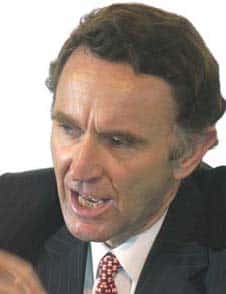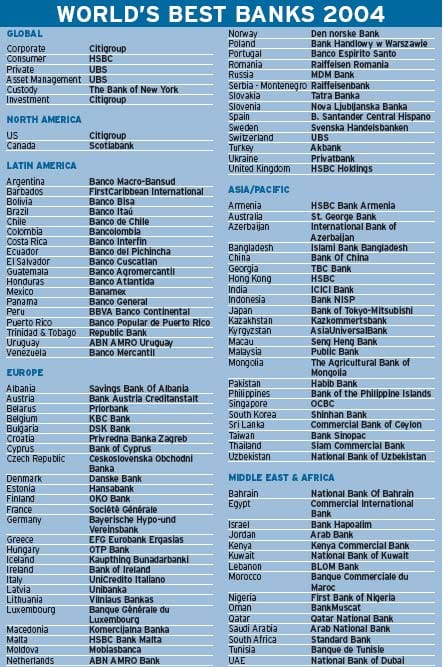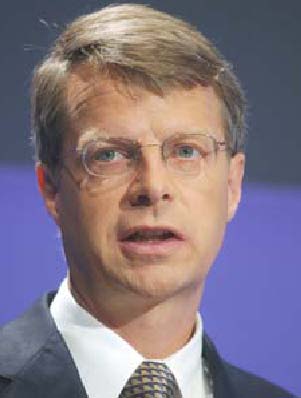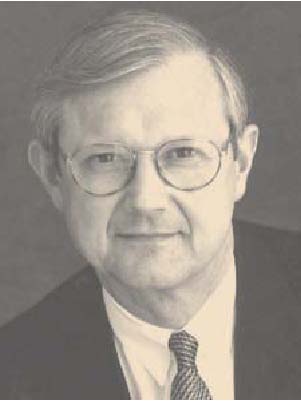THE WORLDS BEST GLOBAL BANKS
A growing global economy made it some-what easier to be a banker in the past 12 months, as credit risks generally de-clined and de-mand for bank-ing services was brisk. The skills of the worlds bankers are being tested at present, however, as a weaker underwriting environment is
forcing greater reliance on advisory and other fees, including those from mergers and acquisitions.Ironically,it is the bank-ing industry itself that is making the biggest contribution to M&A; activity, as industry consolidation continues apace in many countries.
The winners this year are those banks that attended carefully to their cus-tomers needs and accomplished envi-able results while preparing for an un-certain future. Our selections begin with the half-dozen truly global banks that provide the best banking services in these specific sectors: corporate, re-tail, private, asset management, custody and investment banking. Global Fi-nances editorial team also identified the best bank in 97 countries.

|
|
|
A lull in investment banking hurt un-derwriting volumes in equities and fixed-income markets, but revenue from advising on mergers and acquisitions was up 45%. Lending revenues increased 26%, due mainly to an improved performance in credit derivatives and the effect of the KorAm acquisition. Transaction services income was $261 million, a 45% increase over the second quarter of 2003. Citi-group continues to fire on all cylinders.
Robert Druskin, CEO, global corporate and investment bank
www.citigroupgcib.com
BEST CONSUMER BANK

|
|
|
HSBC
HSBCs purchase of a 19.9% stake in Chinas Bank of Communications in Au-gust 2004 will give it a strong foothold in a market of 1.3 billion people.As an ear-ly mover, HSBC has gained the largest foreign presence in Chinas financial ser-vices sector. It holds a 9.9% stake in Ping An Insurance and is hoping to set up a credit-card joint venture with Bank of Communications, which has 2,700 branches in 137 Chinese cities. Londoncredit ratings analysts, banking consul-tants and others in the industry. The winners are leading banks that may not be the largest, the oldest or the most di-versified in a given country or sector, but rather the bestthe bank with which corporations around the world would most likely want to do business.
Within this listing of the Worlds Best Banks we have included our May 2004 list of the Best Emerging Market Banks. Contributors: Gordon Platt, Anita Hawser, Fiona Haddock, Santiago Fittipaldi and W ORLD S BE S T B ANK S 2 004 Johnathan Gregson.
based HSBC, Europes most profitable company in the first half of 2004, is looking for acquisitions elsewhere in Asia. As Global Finance went to press, it was competing with Japans Shinsei Bank for the Aplus consumer-finance business of UFJ Holdings. It was also in the running for a stake in Takefuji,Japans most profitable consumer lender.
HSBC is exporting the expertise it gained from its $14.8 billion takeover in 2003 of US consumer finance company Household International. HSBC is op-erating under the Household brand name of Beneficial in the Polish market, for example, where it purchased Polski Kredyt Bank, now HSBC Bank Polska, in October 2003. Closer to home, HS-BC is partnering with clothing retailer Marks & Spencer in an effort to become a larger credit card issuer in the UK.HSBC purchased Marks & Spencers fi-nancial-services unit in July 2004.
Stephen Green, CEO
www.hsbc.com
BEST PRIVATE BANK
UBS

|
The banks second-quarter 2004 earn-ings rose 28% from the same period a year earlier, largely due to private banking fees. Asset-based fees from loyal wealth-management clients help UBS balance variable revenue from its investment banking and securities unit.
Peter A.Wuffli, CEO
www.ubs.com
BEST ASSET MANAGEMENT BANK
UBS

|
|
Peter A. Wuffli UBS |
UBS puts the emphasis on reliable returns and distinctive service as it seeks to please its discerning asset-management clients. UBS Global Asset Management is one of the worlds largest fund managers, with about $460 billion under management. The division offers a broad range of ser-vices and investment options and employs 2,600 people in 21 countries. Part of Switzerlands biggest bank, the asset-man-agement business relies primarily on fun-damental analysis of securities in imple-menting its value-oriented investment philosophy. However, the alternative and quantitative investment unit offers spe-cialized investments, including hedge funds, while the real estate business ac-tively manages investments in property.
The banks clients include corporate and public pension plans,financial institu-tions and advisers, central banks, govern-ments and charities. UBS has $1.8 trillion in invested assets among its various glob-al businesses, including wealth manage-ment and investment banking.
Peter A.Wuffli, CEO
www.ubs.com

|
|
Thomas A. ReyiThe Bank ofNew York |
BANK OF NEW YORK
Bank of New Yorks product range,tech-nology and customer service have kept it at the top of the global custody business for many years. Assets under custody to-taled $8.7 trillion as of June 30, 2004, up from $7.8 trillion a year earlier.The banks diversified securities servicing and fidu-ciary operations are driving earnings growth.When equity-market trading vol-umes dried up in the second quarter of 2004, the banks execution and clearing revenue declined. However, fixed-in-come-linked areas,securities lending,cor-porate trust and global collateral manage-ment generated healthy gains.
Bank of New Yorks strong depositary-receipts business has been boosted by ris-ing levels of capital raisings by non-US companies, particularly those in Asia, and by active cross-border investing. Earlier this year, the bank introduced a system that enables institutional in-vestors to electronically trade ordinary shares in foreign markets and auto-matically convert those shares to American deposi-tary receipts. Bank of New Yorks network of sub-custodians encompasses more than 100 countries.
Thomas A. Renyi, chairman and CEO
www.bankofny.com
BEST INVESTMENT BANK
CITIGROUP
Citigroup scored a remarkable triumph for a commercial and retail bank by out-performing the cream of the crop in the first annual Global Finance Investment Banks Awards, announced in the June 2004 issue. Citigroups rise to the top of the investment banking world began with the $140 billion merger in 1998 between Travelers and Citicorp, which brought it the Salomon Brothers franchise. In Janu-ary 2000 Citigroup acquired the global investment banking operations of Lon-don-based Schroders, adding 1,400 pro-fessionals in investment banking and eq-uity capital markets. Citigroup already had combined the Tokyo operations of its investment banking arm with Nikko Cordial. Citigroups domination of many of the worlds key investment banking markets is largely the result of acquisitions and alliances, as well as the application of its universal-banking business model.
As competition intensified during the lean years of 2002-2003, more and more corporate clients began demanding that banks that advised them on mergers and financings also supply them with loans.
Robert Druskin, CEO, global corpo-rate and investment bank
www.citigroupgcib.com



